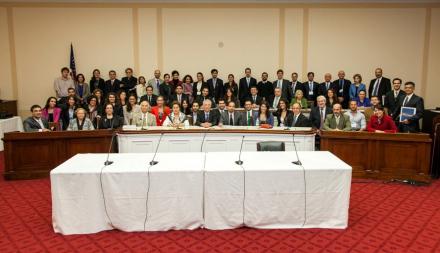
In the spirit of strengthening my voice, I chose to attend the National Iranian American Council (NIAC)’s Leadership Conference in Washington, D.C. held between Sep 30th and Oct 2nd. While attending the conference, I met Iranian Americans from across the country. Through hands-on interactive workshops I learned how an unprepared community can be defenseless and at risk while an organized and engaged community can build strong relationships and project considerable power. I met leaders from other communities who shared stories of their challenges when they were first starting to stand up for their beliefs and, more importantly, gained inspiration from their success and determination in the face of seemingly insurmountable obstacles. My voice has grown stronger indeed but it has room to grow yet… if you, my fellow Iranian American, would join me.
The more recent immigrant communities which make up the melting pot of America, like the Cuban-American, Indian-American, and Armenian- American communities, have all succeeded in having a voice. We can too. I took a few notes during one of the panel discussions on what steps other communities took to succeed and what Iranian Americans can learn from them:
Lesson #1: Build Strong Relationships
In order to reach our full potential as a community, we need to build strong relationships both within our community and with others. We need to know the common ground and areas of disagreement and be able to discuss and deal with these disagreements openly and constructively, without resorting to name calling. As panelist Aram Suren Hamparian, Executive Director of the Armenian National Committee of America, stated: “If you do not manage your differences, others will manage your differences for you.”
One particularly good example of a community overcoming inner-differences in order to advocate for their greater good is the Arab-American community. Dr. James Zogby, President of the Arab American Institute, spoke about how the Arab-American community grew out of the civil rights movement of the 60s and 70s. They became politically involved with the campaign of Jesse Jackson in 1984 where they had 4 Arab American delegates at the Democratic National Convention. By 1988 they had 52 Arab American delegates. As they grew, they encountered internal issues related to identity. Some Arab Americans identified themselves, and still do, based on their country of origin, others based on their religion, still others based on the village or tribe they belonged to. These conflicts, however, had to be successfully dealt with in order to achieve the community’s core objectives. There were also external conflicts with other ethnic communities attempting to delegitimize the voice of the newly emerging Arab-American community. Although these attempts were painful and difficult to overcome and still an issue at times, the Arab-American community addressed them by reaching out to allies in other communities like Jesse Jackson, Ron Brown and Joe Lieberman. I strongly recommend listening to the video taped session of this panel.
Lesson #2: Have a Clear Mission & Strong Grassroots
To have a strong voice we need to have a clear mission, which is supported by the majority of the community. Being able to effectively communicate and/or advocate for this mission will require both an understanding of the policy-making process as well as an energized grassroots. For example, if we as a community are opposed to a U.S./Iran war, then intervening to prevent a bill advocating for war needs to be done not once the bill has already passed, but rather when we still have a chance to change its course. As panelist Tom Dine, former Executive Director of the American Israeli Public Affairs Committee (AIPAC), stated: “Grassroots political action is just not grassroots. That’s where you live. It’s what you do where you live.” Being silent and deferential doesn’t work in a democracy. We need to be, as one panelist put it, the “squeaky wheel” in order to be heard loud and clear.
As reflected by these notes, there are many steps involved to owning a strong voice, but the first step is to show up.
This strategy works. Iranian Americans, through NIAC, have been able to identify issues important to us, engage with our representatives, defend our civil liberties and achieve our objectives. Some examples include:
● Leading the fight to change single entry to multiple entry visas for students studying in the United States. The burden of single entry visas was both personal and professional; for example, it prevented people from attending a family member’s funeral, or precluded them from attending international conferences in their field of study.
● Earthquake relief via an extension of sanctions waiver by the US Treasury department on Oct 9th, after grass-roots outreach by the Iranian-American community.
● Consistently opposing war, including blocking Congressional measures in 2008 and 2010.
Overall, the NIAC Leadership Conference provided a great opportunity to learn about our participatory democracy and make some great new friends (I’ve already met up again with several of them both socially and to continue the important work ahead.) The NIAC platform which consists of: no war with Iran, support for targeted sanctions against human rights violators as opposed to broad indiscriminate sanctions, and the demand for human rights to be protected as part of any final negotiated settlement between the US and Iran, is compiled based on feedback from the NIAC membership. If you agree with this platform, then join and add your voice. Otherwise, we risk having others speak for us.






